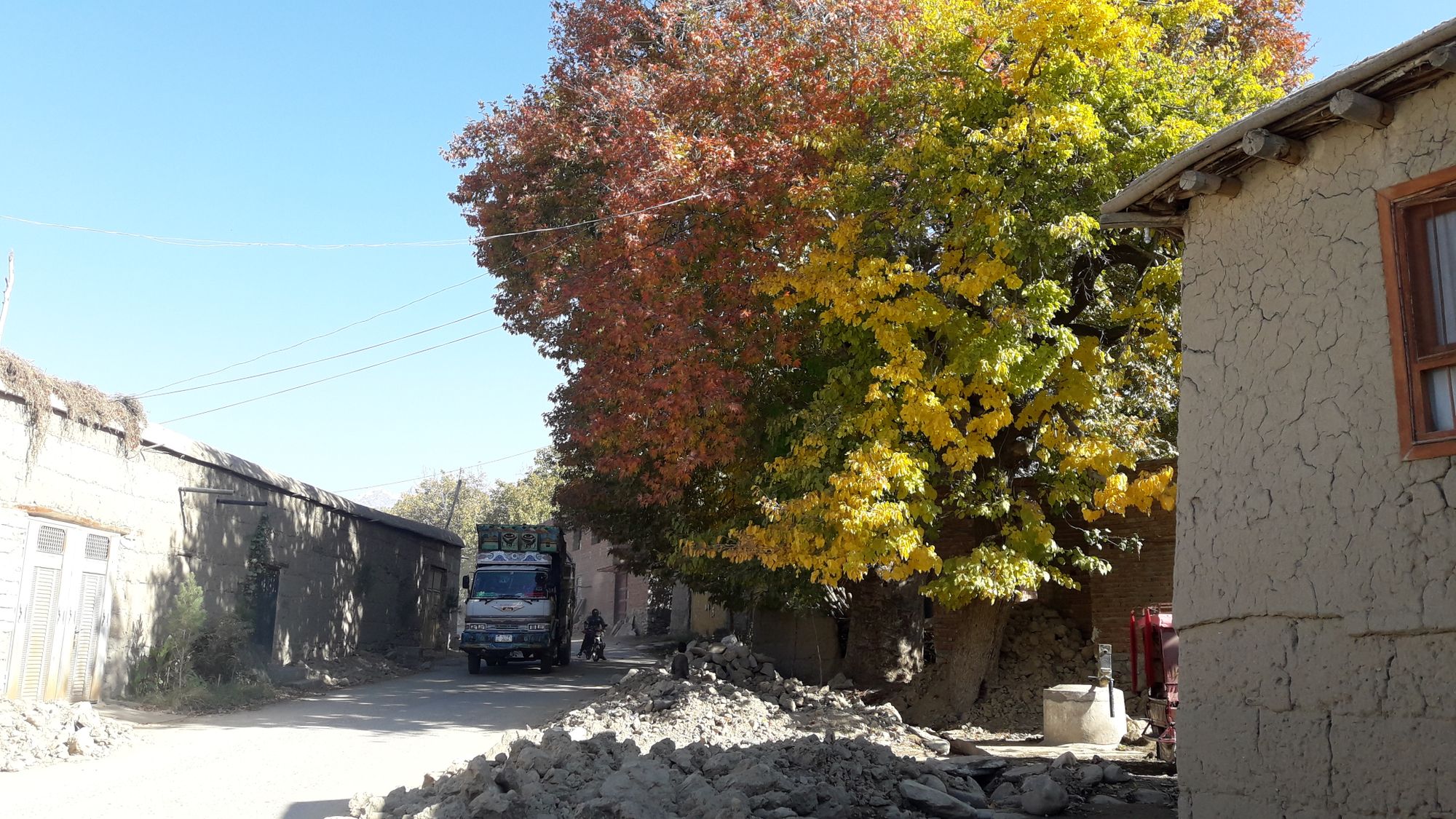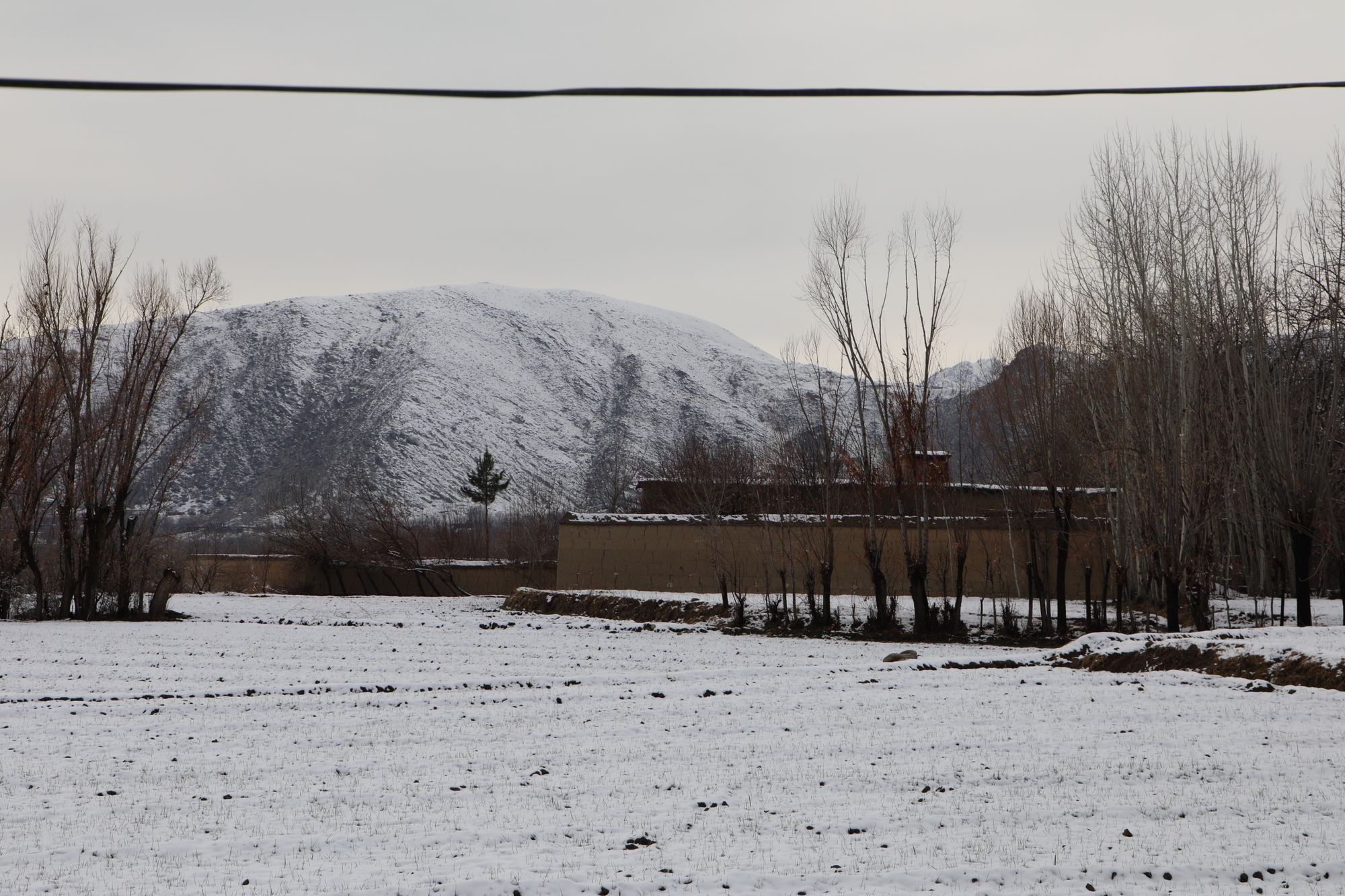Name Calling: an Afghan Curse
Muzghan Rawoofi helps her household by knitting and embroidery after returning to her hometown following the Taliban takeover of Afghanistan in mid-August of last year.

Muzghan Rawoofi helps her household by knitting and embroidery after returning to her hometown following the Taliban takeover of Afghanistan in mid-August of last year.
— One Day in Afghanistan —
Written by Abdul Ahad Poya, edited by Mohammad J. Alizada and Brian J. Conley
“Go knit something you son of a “Jola” (knitter), you have no business playing football?!”
The negative labels placed on people due to the professions through which they earn a living, has led many to give up their desired profession and forget all about their dreams. Behind all these challenges lies the unseen influence of illiteracy and ignorance.
Villagers do not behave normally with individuals who’ve been branded like this, they don’t marry their girls into the families or accept girls from the families as brides.
The district of Nijrab, located in Afghanistan’s eastern Kapisa province, has the highest rate of literacy among the total of 389 districts across the country, but it still is no exception.
“My son tells me - don’t do this mom, rumors have spread across the village that everyone in Naseer’s house has started knitting, people of the village are calling us Jola,” said 56 year-old Muzghan Rawoofi who returned to Qala-e Khawja village of Nijrab after spending 9 years in Kabul.
39 year-old Naseer is one of the couple’s nine children. Qala-e Khawja is about 130 kilometers northeast of Kabul.
The family had to return to their home after the collapse of Kabul to the Taliban in mid-August of last year and the escape of her son, a former Afghan National Army officer who served for eleven years, and who was the only breadwinner of the household, to neighboring Iran.
Ms. Rawoofi now knits socks, pouches, bags, gloves and Tajiki yakhans to provide for the family. These types of handicrafts are used in Tajikistan but have recently piqued the interest of girls living in rural Afghan villages.
Yakhans are the beautifully embroidered necklines of the traditional Afghan shalwar kameez, as well as women’s dresses varying widely in design.
The title or pseudonym Jola is given to someone who knits, Dalak to a hairdresser, and Kulal to a potter who makes ovens, plates, glasses and other ornamental objects out of soil and mud. These titles are intended to be derogatory and insulting.
Oftentimes families try hard to keep what they do hidden from the public eye so as to avoid being shamed for a skill that in many cultures would have no negative impact on the individual.
These titles or nicknames are so unpleasant and unbearable for people with these professions that a number of them either carry it on in secret or leave it all together and take up something they don’t have the skills for.
On the contrary, those who use these derogatory language often do the same things in other countries and make a profit from them. Some clear examples of this are Afghan refugees making shoes or owning beauty and hairdresser stores in neighboring Iran.
I head to Nijrab from Kabul to profile the Rawoofi family for a day. Thirteen passengers including children have filled the front seat, back seats and the cargo hold of the car. The space is incredibly tight and the roads to Nijrab are full of twists and turns.
I reach the village around 9 am, after crossing snow-capped mountains and deserts blanketed in white. The village seems empty, fewer people pass through the village than before the government collapse and children are not seen playing around as much as they used to. A village that used to bustle with activity and nostalgia no longer has any life.
Qala-e Khawja is the hometown of lead Alive in Afghanistan correspondent Abdul Ahad Poya.
Following the Taliban takeover of Afghanistan in mid-August of last year, most of the youth and teenagers have migrated elsewhere.
Alive in Afghanistan has observed that since the collapse of Afghanistan’s western-backed government, an increasing number of people are taking up embroidering, sewing, knitting, weaving carpets and handicrafts across the country due to increasing poverty and the economic collapse.
For more information about handicrafts made by Afghans, check out these articles by Alive in Afghanistan, (Woman Owned Businesses at Risk in Afghanistan), (Afghanistan’s Southern Kandahar, Known for Finest Embroidery Across the Country), (Namad Bafi — a Handicraft for the Mountains), (Hard Work, Lost Hope of an Afghan Embroiderer), (Only the Dark Stops Her), and (Nowhere is Like Your Own Country).
It’s 9:15 in the morning, I head towards Rawoofi’s home after seeing the village. They greet me with open arms and invite me to their living room. The room is adorned with a Sandali, a traditional table stove heater like the Japanese ‘Kotatsu’.
This is home to a family of 17, built of mud some 70 years ago by Shokoor’s father. 72 year-old Abdul Shokoor, the grandfather of the Rawoofi family is ill, his lungs have gotten weak. He sits with half of his body under a blanket covering the Sandali while Muzghan, who has a bit of a headache, is sitting on another side of the Sandali.
The grandchildren Yasamin, Mujtataba, Marhaba, Sosan, and Mahsa are busy playing with a plastic toy car in the empty space of the room. 24 year-old Muzhda, the couple’s only daughter, is calling her brother who drives the Kabul-Nijrab road using his personal station wagon.
Waheed, Fawad and Humayoon, three of the couple’s sons are married and live in Kabul with their children. The others, Farhad and Jawad, are single and working in Iran; Aziz, the couple’s youngest child at 17, has only recently arrived in Turkey after taking the illegal migration route that has become a common path for young Afghan men.
Former Army officer Shirin Aqa has been in Iran for six months but is still to find a job. Naseer’s wife is in the kitchen preparing lunch.
After drinking tea with cake, the real story begins. They are first reluctant to share their story but agree to do so after understanding the importance of this issue. Ms. Rawoofi takes down some embroidered yakhans and puts them on the Sandali covered by a large blanket, showcasing her work to me. Muzghan busies herself doing embroidery.
“People do not have a positive opinion of us. They taunt us, saying we have began the ‘Jolayi’ profession, that’s why Naseer does not want to us to do this, but we have spoken to him, and brought up our reasons and convinced him,” Ms. Rawoofi says.
Jolayi is also a term used for knitters.
Out of a total of 11,000 square meters of farmland, the family has had to sell about 8,000 square meters to pay for their sons’ wedding costs over the years. The couple do not have any plans for marrying their four remaining sons anytime soon due to the poverty that grips their family.
Parents in Afghanistan have long had the responsibility of choosing a wife for their sons, as well as most times having to pay for their wedding, even if it means selling their property. That is often the only option left when the family doesn’t have money to spare.
Suddenly an argument ensues between Mujtaba and Marhaba over a toy but Muzhda silences them. Another half an hour is spent conversing while Muzhgan shows me her trade and a plate of apples is brought. I cut one of the apples in half, and give the other half to old man Rawoofi.
While showing me several unfinished kameezes, Muzghan talks about their return, “We had no other choice, when we lost the ability to pay rent and Shirin Aqa headed to Iran, we gave into returning to our village so we could live together because at least the water and some other stuff would be free.”
She adds, “Although we do not have a lot of land, we still can grow some vegetables and have some berry and walnut trees. We can also use the wood from those for heating our home.”
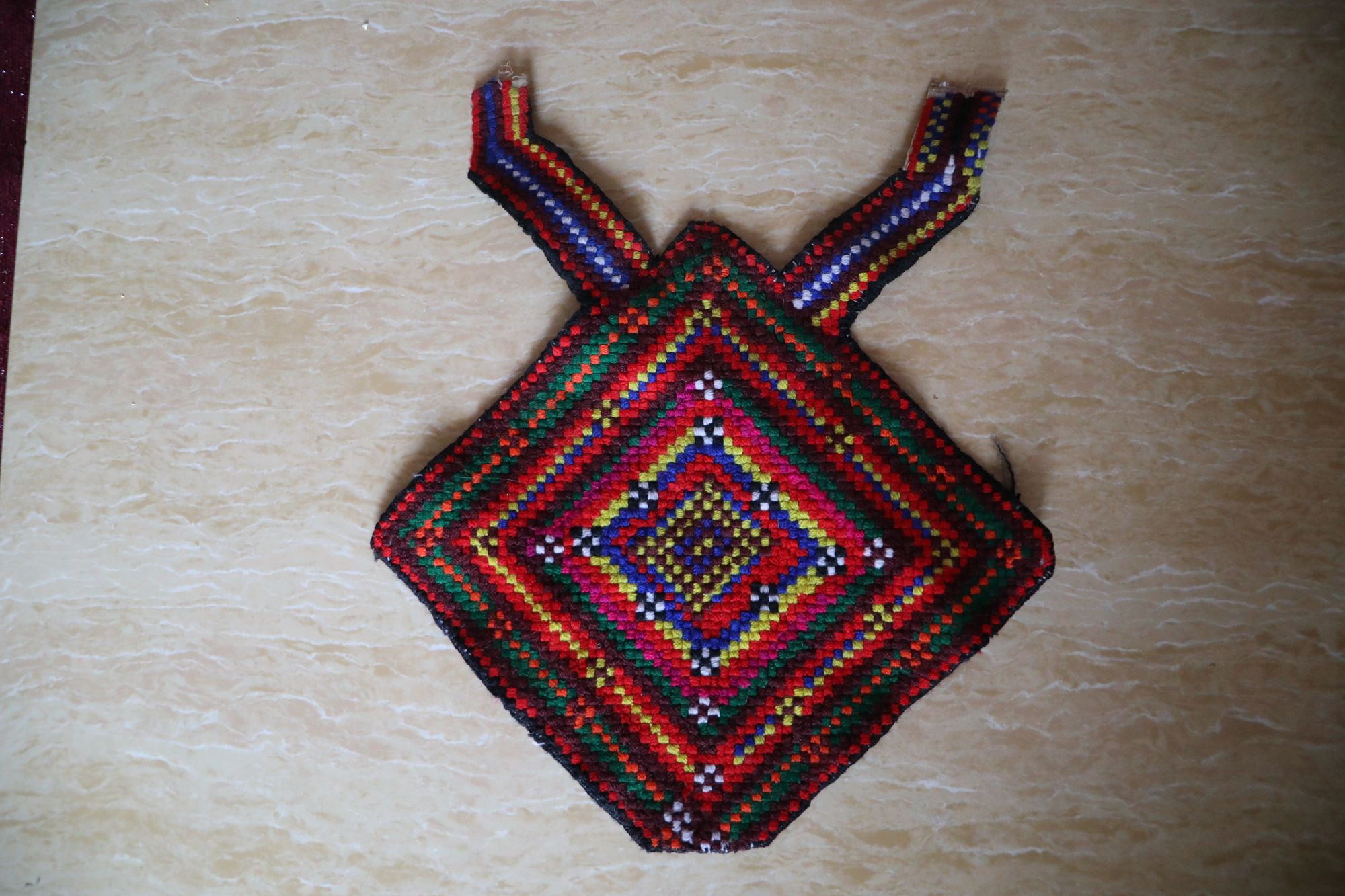
The family left for Kabul around 9 years ago as Shirin Aqa was working, in the hopes of making a better life.
The clock shows it’s 11:30 in the morning. I request Muzghan to show me how she knits. As an example, she takes a cement bag, which has some patterns drawn on it. She takes a needle, threads it with strands she has taken from old jackets and starts knitting. She knits square frames in different sizes as beautifully as if her needle is enchanted.
Muzhgan learned knitting from neighbors when she was a child, at that time she lived in Kabul with her dad. She says, “I stole the idea from the neighbors’ girls, they were telling me I couldn’t do it, but after seeing how they did it about three times, I knitted and learned how to do it better than them.”
That was 35 years ago when people would make most of their basic supplies like sacks, bags, gloves themselves as the use of money was less and imports lesser.
Although Muzhda and two of her grandchildren have learned how to knit they need more experience to become professionals so they can weave and embroider without help from others.
Muzhda takes the yakhan from her mom and begins knitting, demonstrating that she has learned the trade well, Mustafa and Yasamin also want to show me their skills in the handicrafts but the phone on top of the TV table in one corner of the room starts ringing, Muzhda answers and says it’s Naseer asking about the health of their dad.
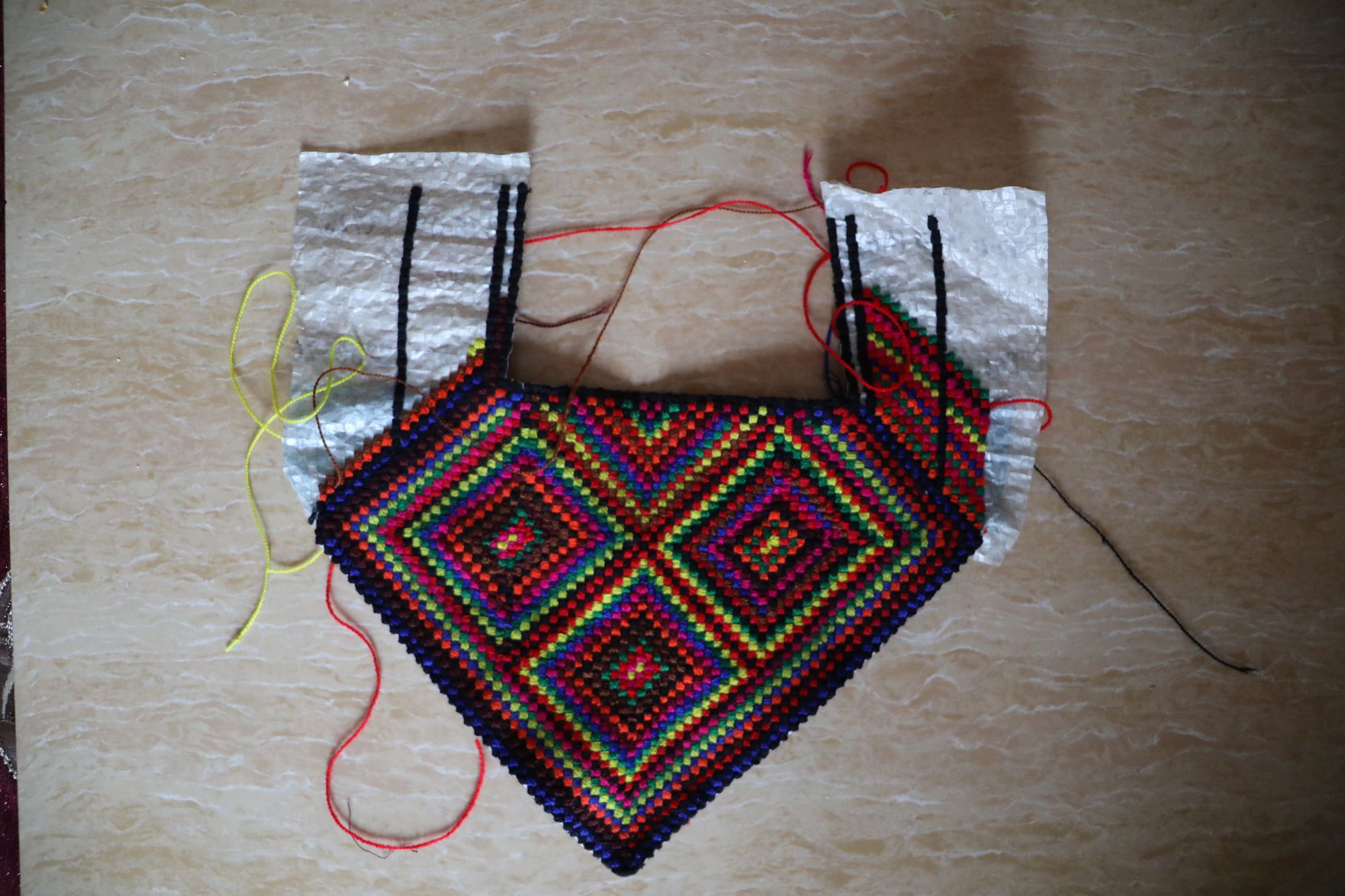
We talk about Shokoor’s health for a little while. According to Muzhda, “My dad lost the ability to walk over a year ago, he has not even been to the village mosque in the 6 months that we have been here, now he occasionally prays using gestures.” Muslims who are ill are permitted to use a series of gestures if they are not able to perform the traditional movements that are part of their prayers.
My watch is showing it’s 1 in the afternoon, but they don’t allow me to leave for lunch. Mujtaba enters with a copper bowl and a pitcher in hand so we can wash our hands, after the handwashing is done, Muzhda reenters with her sister-in-law holding platters of shorba, meat and potatoes. Fresh Afghan flatbread cooked at home coupled with the Shorba is delicious and the conversation delightful.
Shorba or shorwa is a soup cooked with beef, or lamb, coupled with potatoes. The bread is broken into small pieces and added to the soup, the potatoes and meat are either served on the side, or added to the soup after the bread is mixed into it.
The pitcher and bowl are used for handwashing in Afghanistan before and after meals. Afghans are gracious hosts across the country regardless of their wealth status. Entering an Afghan home and leaving without drinking tea is considered rude. Maybe the only time poverty-stricken families will eat well is when they have guests, but they never back out of treating their guests to the best meal they can provide.
While eating, Muzhgan talks about returning to knitting, “We didn’t have another breadwinner in the family after Shirin Aqa left, because Naseer lived here with his dad, wife and kids, his income was only enough to feed his own family.”
The government didn’t pay 3 months of Shirin Aqa’s salary while the family owed 3 months of rent to their landlord.
“We sold all the carpets and dishes to pay the rent,” Muzghan told Alive in Afghanistan.
After the family’s return to their village, the pressure on Naseer increased and the only skill the mother had was knitting and Tajik yakhan embroidery.
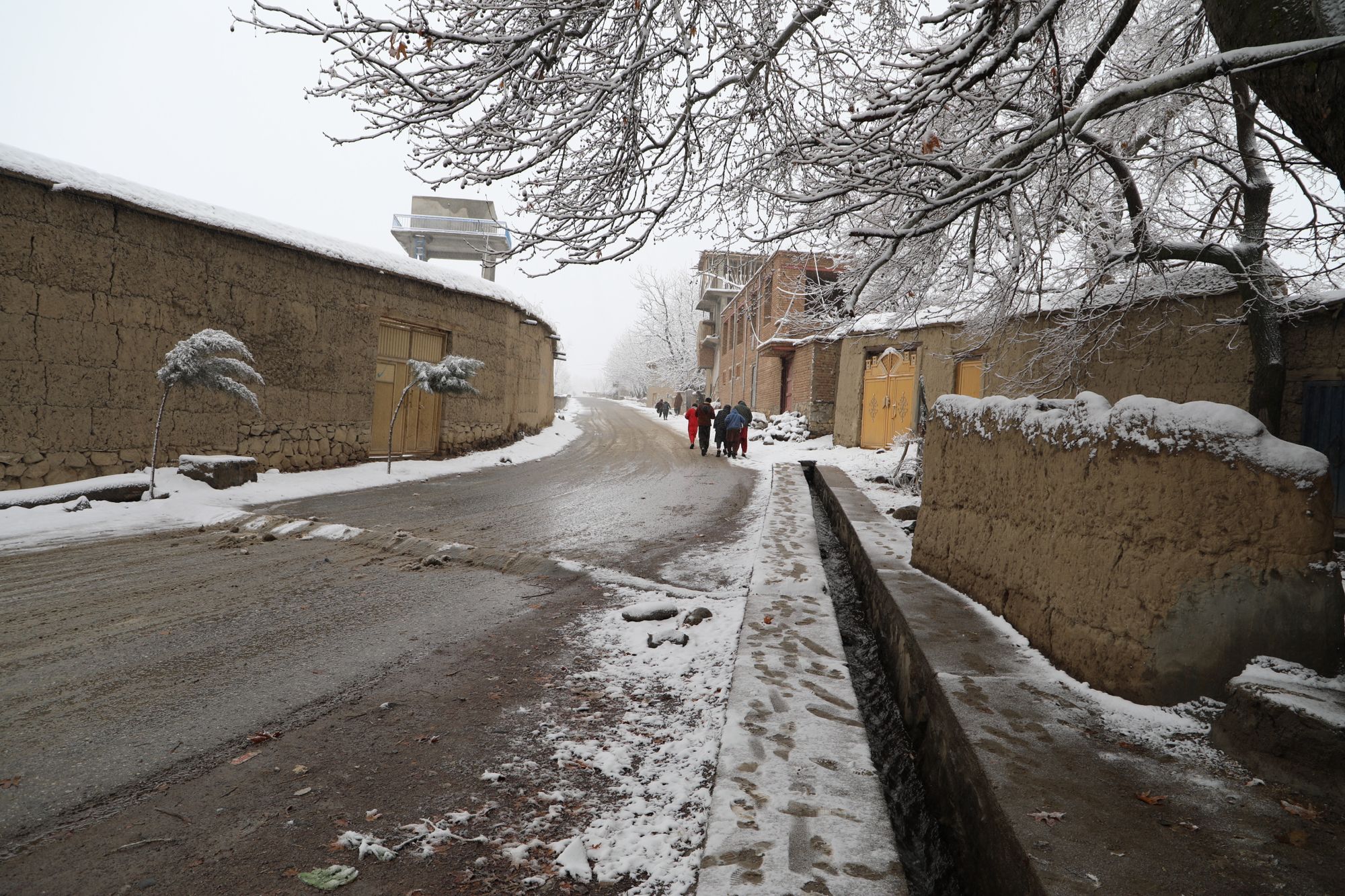
“I made socks and gloves for the grandkids for a few days, as well as trying my hands at embroidery so I could make sure that I didn’t forget. Then I bought the thread from the bazaar but couldn’t afford the cloth used for making the yakhan. Thinking to myself I realized that cement bags could be used as an alternative for practice and used that,” Muzhgan says.
According to her, a neighbor who came to their home to visit Shokoor entered the room suddenly while Muzhgan was knitting, after which the news spread through the village, compelling the family to make it public.
“Although Naseer’s opposition was unprecedented in the beginning, over time we convinced him in order to make ends meet,” Muzghan says of the terrible experience that the family has suffered because they have chosen to use their skills to find income.
According to her, Naseer’s opposition had a reason, “One day Mujtaba had a verbal conflict with children in the village while playing football in the neighboring garden. The other side tells him - Go knit something you son of a “Jola” (knitter), you have no business playing football?!”
Muzghan sells the socks, gloves, bags for 20 Afghanis, each of these take about an hour to make. But if the thread is provided by the customer, the price drops to 10 Afghanis. They sell an embroidered yakhan for 200 to 300 Afghanis, which takes between 2 to 3 days to make.
In the 5 months since they began, they have only received 2 orders for doing embroidery for 500 Afghanis but orders for bags, socks and gloves have reached up to 80. According to Ms. Rawoofi, the half gloves are worn more for fashion than for warmth.
A neighbor’s girl who has previously ordered 2 bags knocks on the door, Muzhda gives the gloves to Mujtaba who comes back with 40 Afghanis in hand.
“Fereshta said tell your aunt to make me a pair of socks and a pair of gloves, all black,” Mujtaba says as he hands the money to his grandma.
The time is 2:30 in the afternoon, Muzhda who has been suffering from stomach problems for a while also complains of pain in her shoulders.
“The pain increases when I do embroidery or knit,” Muzhda says. Although she uses the medication she has at home, it doesn’t really help that much. Muzhgan plans to take her daughter to the doctor in the district bazaar that is about 4 kilometers (~2.5 miles) from their home.
“I am going to take Muzhda for a checkup and an injection, as well as show some of the bags to the shops to see how much they would like to buy it for,” Muzhgan says before they prepare to go. They will walk the entire way there and back as they have no other mode of transportation available.
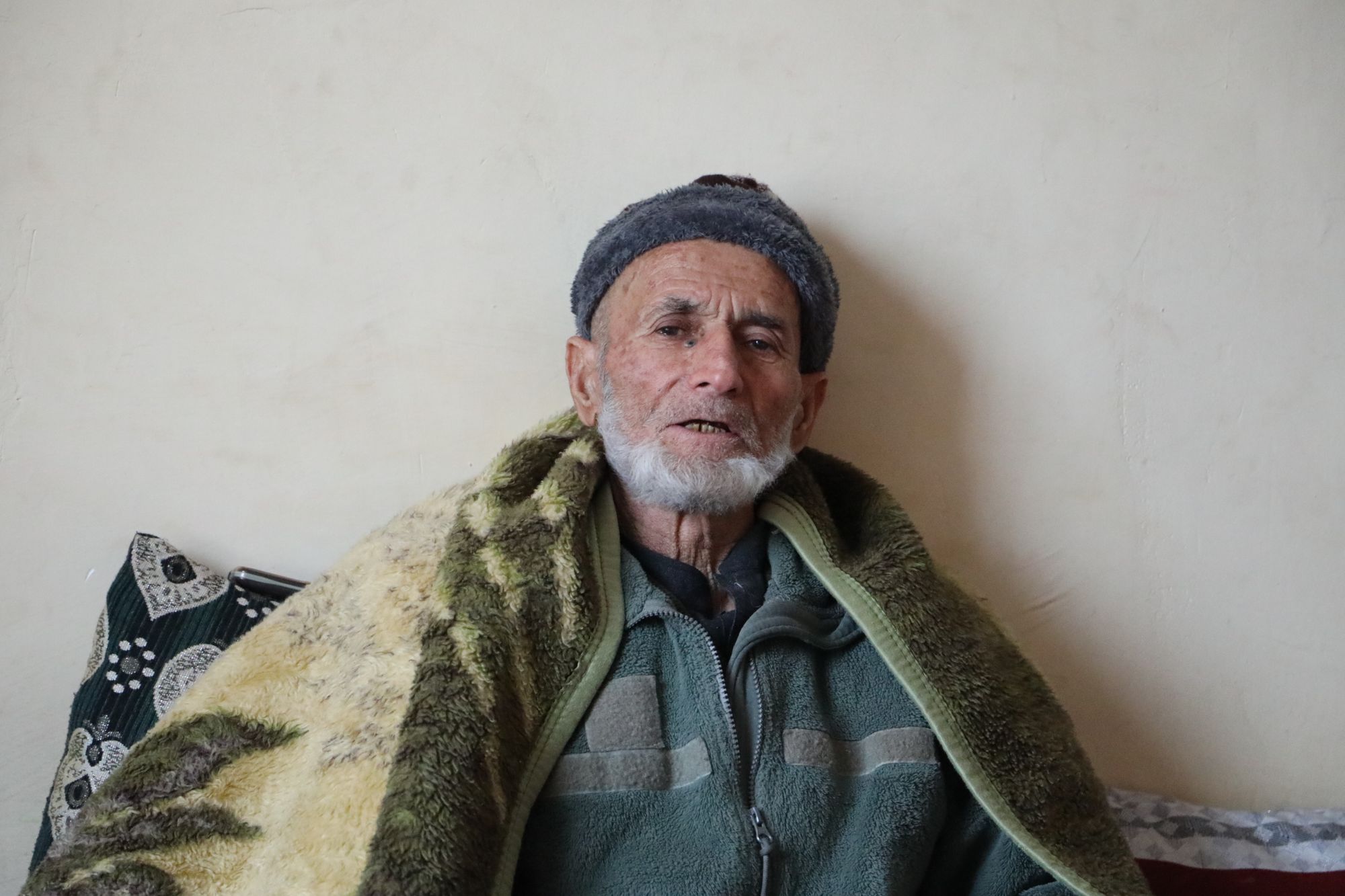
Abdul Shokoor and I remain at home, the children leave to go to the village mosque to study, while little Mahsa and her mom rest in another room. Abdul Shokoor lifts his head from the pillow as his wife and daughter are leaving and leans against the wall, putting the pillow behind him. For over an hour and a half, he retells the story of his youth to his last job (1962 to 2014).
Abdul Shokoor remembers everything from being a soldier during King Zahir Shah’s rule (1933 to 1973) to an office clerk during the Karzai administration (2001 to 2014). The best period of his life according to Mr. Rawoofi is during King Zahir Shah’s rule.
“We had calm and comfort, the salary was low but all the facilities from foodstamps to shaving blades were distributed for soldiers,” Mr. Rawoofi says.
Shokoor, who loves his son Naseer most among his 8 children, says that his reason is Naseer’s constant care for him. Mr. Rawoofi points to 2 year-old Mahsa, one of Naseer’s kids and says, “I love her the most among my grandchildren because she listens to what I say.”
The man has witnessed 12 changes of government including monarchy, republic, the Mujahadeen era, the Taliban’s first period in power, the Karzai and Ashraf Ghani administrations and now the Taliban’s Islamic Emirate. He served ten of these governments in different capacities. His biggest wish throughout life, to own a home made of concrete in Kabul where he could live with a calm mind and without worrying about rent, never became a reality.
Finally the mother and daughter return from the district bazaar around 4 pm with withered faces and holding some medication. Naseer’s wife brings them some tea. While drinking tea, they recite the reason behind their sadness.
“We went to several shops but none would purchase our products at reasonable rates, all would only pay about 15 Afghanis for each bag, which is not worth the trouble,” Muzghan says.
Although she tried to convince the shopkeepers to buy her products for 20 to 25 Afghanis and she will provide bags, socks, gloves, and yakhans to them on a weekly basis, they still returned home disappointed, failing to make any sales at all.
Shopkeepers told Muzghan while what she makes are valuable handicrafts, they would not be able to sell them. The shops are already stocked with similar machine-made goods at a lower price tag that are imported from China and Pakistan.
Shoppers would rather buy products that are cheaper due to Afghanistan’s bad economic situation.
Naseer calls again in the last minutes of my day profiling the family saying he will not be able to come home that night because he had no return passengers. Before he hung up he also asked us to bring someone from the neighborhood to inject Mr. Rawoofi with his medication.
Muzhda guides me on how to mix the different medications together for the injection despite my reluctance and I inject Mr. Rawoofi with his medication. Ms. Rawoofi insists on gifting two red women’s bags to me and refuses to take money for it as I say goodbye to the family.
Editor’s Note:
Alive in Afghanistan initially wanted to do a story about the hometowns of each of our correspondents, this the second story in a series about our correspondents’ hometowns.
Our lead correspondent Abdul Ahad Poya originates from Qala-e Khawja.
